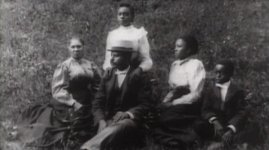Teachers' Domain - Digital Media for the Classroom and Professional Development
User: Preview

Source: The Rise and Fall of Jim Crow: “Promises Betrayed”
Worker (V.O.): I been factory hand, janitor, porter and butler, and wipin' up engines on the railroad. I worked as a helper for carpenter and layin' brick for masons. I been a driver of teams, a pick and shovel man, and drove steel for a section boss. I was a hand on the Mississippi, and workin' in a steel foundry and seem like I did a hundred mo' jobs.
W.W. Law: My grandmother would work in the tub washing the clothes of the prominent white people. For all of that washing, for the whole white family, washing and then ironing, she got a dollar and a half for the whole family laundry, so there were several families that she had. But it was just a dollar and a half for all of that work.
Dorothy Bolden: White folks didn't have no feelin' for you. They pretended they did. They had nannies to give their child comfort. That was my name: "Nanny". They would teach their children they was better than you. You was givin' them all that love and you'd hear them say, "You're not supposed to love nanny. Nanny's a nigger." And they could say it so nasty. ‘Til it would cut your heart out almost and you couldn't say a mumblin' word.
Dorothy Bolden: A woman knows how to shift the smile when the burden is so heavy. Know how to smile when she want to cry. Smile when sorrow done touched her so deeply. So that's why I feel black women in this field had to pray and had to moan and had to cry.
Dorothy Bolden: Them prayers went a long ways and protected a lot of people. And God wiped away those tears. And the next morning, we had the strength to go on.
Narrator: But despite all the obstacles, blacks began to rise. More blacks were being educated. There was now a growing black middleclass. And the children of the former slaves were not to quick to bow down to the white man as their parents had.
Leon Litwack (V.O.): Whites perceived a new generation of black Southerners, the sons and the daughters, and grandsons and granddaughters of the former slaves…who had not been disciplined by slavery, who had never known slavery, who were perceived as much more restless, and obviously, much more threatening because unlike some of their parents and grandparents they seemed less afraid of whites.
Black Student: We are not the Negro from whom the chains of slavery fell a quarter of a century ago, most assuredly not. We are now qualified as being the equal of whites, and should be treated as such.
Narrator: Every time we see a Negro physician, it does us good. When we see a Negro pharmacist, it goes still better. When we see the lawyers, professors, bank presidents, inventors, machinists, mechanics we grin as much as our mouth will allow and shout - the Negro is coming!
Narrator: Many whites feared since the end of slavery that blacks would come to feel they were equal to whites. Now that fear seemed realized.
White businessman (V.O.): The colored race is getting more unreliable. Freedom has ruined them in every way. Only the old timey darkies can be trusted. The young ones are sullen and grow more insolent every day.
White Woman (V.O.): They don't sing as they used to. You should have known the old days of the plantation. Every year, it seems that they are losing more and more of their own confessed good humor. I sometimes feel I don't know them anymore. They have grown so glum and serious that I'm free to say I'm scared of them.
Narrator: No where was this fear more pronounced then in Memphis, Tennessee, where in the 1880's 40 percent of the population was black. Faced with this growing black presence, whites demanded that the informal practices which had segregated the races since 1865 become legalized and strictly enforced. Grace Hale: The laws were intended to accomplish what it was clear that the conventions were not going to accomplish which was again to make African Americans act inferior. Again if white people couldn't make African Americans be inferior, if they couldn't prevent them from attaining a kind of middle class status despite the violence and despite the discrimination, then they could make them act inferior.
 Loading Standards
Loading Standards